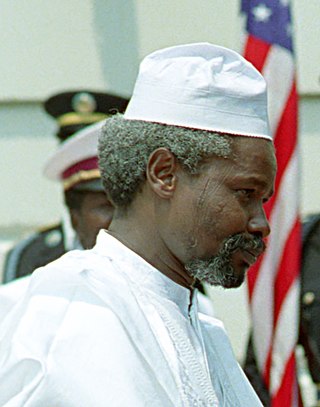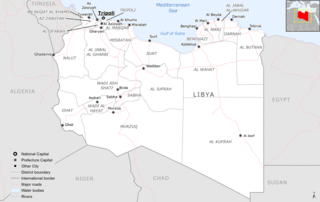This article needs additional citations for verification .(February 2022) |
The following is a list of massacres that have occurred in Libya (numbers may be approximate):
| Name | Date | Location | Deaths | Notes |
|---|---|---|---|---|
| Al-Jawazi tribe massacre | September 5, 1817 | Benghazi | Nearly 10,000 | Ottoman Pasha Yusuf Karamanli ordered the extermination of Al-Jawazi tribe, following a dispute regarding tribute and uprising against his rule. [1] [2] |
| Sciara Sciatt massacre | October 23, 1911 | Tripoli outskirts | Nearly 500 "Bersaglieri" | Italian soldiers were massacred with cruelty and sadism, 290 of them after surrender. [3] |
| 1911 Tripoli massacre | October 24–26, 1911 | Tripoli | some 4,000 [4] | Italian troops massacred the Muslim Libyan population of the Mechiya oasis the day after the Sciara Sciat massacre. In three days hundreds of civilians, children, women were killed. One hundred women and children were burned in a mosque after mortar attack. [4] |
| 1945 Tripoli pogrom | November 5–7, 1945 | Tripoli | 140+ [5] [6] [7] | Muslim rioters killed Libyan Jews; 36 victims were children. |
| 1948 Tripoli pogrom | June 12, 1948 | Tripoli | 12 [6] | Muslim rioters killed Libyan Jews. |
| 1967 Tripoli pogrom | June 5, 1967 | Tripol | 18 | 18 Jews were killed in the pogrom and at least 25 injured |
| Green Terror | 1973–1977 | All Libya | Unknown | |
| Abu Salim massacre | 29 June 1996 | Abu Salim prison, Tripoli | Up to 1200 [8] | Prisoners expressed anger at the restricted family visits and poor living conditions, and were subsequently shot and killed. |
| Warehouse in Khalit El-Ferjan, Salahaddin | 23 August 2011 | Suburb to the south of Tripoli | At least 47 | The building was being used as a temporary prison by the Khamis Brigade, the elite force headed by Col Gaddafi's son. [9] [10] |
| Gargur District | Around 21 August 2011 | Gargur, Tripoli | At least 17 | Appear to have been shot dead by pro-Gaddafi troops as the rebels advanced on the Gargur district of Tripoli. Those killed were said to have been held prisoner at an Internal Security building in the district. [11] [10] |
| Camp outside Bab al-Azizia | August 2011 | Bab-al-Azizya Compound, Tripoli | At least 29 | Not yet known whether the killings were carried out by rebel fighters or pro-Gaddafi troops. [10] |
| Hotel Mahari | October 2011 | Hotel Mahari, Sirte | 53 | HRW said they believed the hotel had been in the hands of anti-Gaddafi forces from Misrata. |
| 2015 Corinthia Hotel attack | January 27, 2015 | Corinthia Hotel Tripoli, Tripoli | 10 | Car bombing , suicide attack and subsequent hostage situation in hotel known for hosting foreigners and government officials. |
| 2015 kidnapping and beheading of Copts in Libya | February 2015 | Southern Mediterranean Sea Coast, Sirte | 21 | Beheading of 21 Egyptian Coptic Christians By Islamic State |
| Al Qubbah bombings | February 20, 2015 | Al Qubbah | 40 | ISIL operatives detonated three bombs in Al Qubbah, targeting a petrol station, a police station, and the home of parliamentary speaker Agila Salah. These attacks reportedly killed at least 40 people |
| Zliten truck bombing | January 7, 2016 | Zliten, Murqub District | 60+ | Suicide truck bombing at a police training camp |
| Brak al-Shati Airbase raid | 18 May 2017 | Brak al-Shati Airbase, Wadi al Shatii District | 141 | |
| January 2018 Benghazi bombing | January 23, 2018 | Benghazi | 41 | Twin car bomb attack outside a mosque |
| February 2018 Benghazi bombing | February 9, 2018 | Benghazi | 2 | A bomb exploded in a mosque. |
| 2018 attack on the High National Elections Commission in Tripoli | May 2, 2018 | Tripoli | 16 | Suicide bombers attacked the head offices of Libya's electoral commission in Tripoli, killing at least 16 people, injuring 20 and setting fire to the building |
| 2019 Tajoura migrant center airstrike | July 2, 2019 | Tajoura Detention Center, Tripoli | 53 | An airstrike by Field Marshal Khalifa Haftar's Libyan National Army hits the Tajoura Detention Center outside Tripoli, while hundreds of people are inside the facility, killing at least 53 of them and injures 130 others. [12] |
| Tripoli military school airstrike | January 4, 2020 | Al-Hadhba military school, Tripoli | 26 | the United Arab Emirates aiding the Libyan National Army launched an airstrike on a military school used by the UN-backed Government of National Accord in Tripoli. Twenty-six people were killed and thirty-three were wounded |
| Mizdah massacre | May 27, 2020 | Mizda | 30 | A group of migrants mainly composing of Bangladeshis were executed by their human traffickers. |












